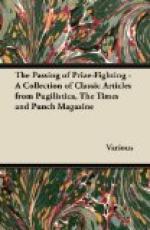MODERN TYPES.
(BY MR. PUNCH’S OWN TYPE WRITER.)
No. XVI.—The Hurlingham girl.
It is not so easy as it might appear to define the Hurlingham Girl with complete accuracy. To say of her that she is one whose spirits are higher than her aspirations, would be true but inadequate. For, at the best, aspirations are etherial things, and those of the Hurlingham Girl, if they ever existed, have been so recklessly puffed into space as to vanish almost entirely from view. In any case they afford a very unsubstantial basis of comparison to the student who seeks to infer from them her general character. Yet it would be wrong to assume that she has dispensed with the etherial on account of her devotion to what is solid. Indeed nothing is more certain about her than the contempt with which she has been willingly taught to look upon all the attainments that are usually dignified with this epithet. History and geography, classics and mathematics, modern languages (her own and those of foreign nations), all these she candidly despises. Let others make their nests upon the shady branches of the tree of learning. For herself she is fain to soar into the empyrean of society, and to gaze with undazzled eyes into the sun of the smart set. She has of course had the advantage of teachers of all sorts, but the claims made upon her time by thoughtless parents have usually been so great as to leave her at the end of her school-room period with a few brittle fragments of knowledge, which shift and change in her mind as the bits of glass might shift in a kaleidoscope from which the looking-glass had been omitted. It is enough for her if, in place of historical dates, she knows the fashionable fixtures, whilst Sandown and Kempton, Ascot and Goodwood, Hurlingham, and the Ranelagh, supply her with a variety of knowledge infinitely more interesting and “actual” than the dry details of population, area, climate, and capital towns, which may be learnt (by others) from primers of geography.
Although it is, from their and her point of view, eminently desirable that the parents of the Hurlingham Girl should be rich, yet it is by no means absolutely necessary. It is, however, essential that they should possess a social position which will ensure to them and to their daughter an easy entrance into that world which considers itself, not perhaps better, but certainly good. Her mother has probably discovered long since that the task of being thwarted by her daughter is an intolerable addition to her social burdens. She therefore permits her, with as much resignation as she can command, to take her own course in all those matters that do not conflict directly with the maternal plans, and she may even come to take a pride in the bold and dashing independence by which her daughter seeks to relieve her of all responsibility, if not of all anxiety.




